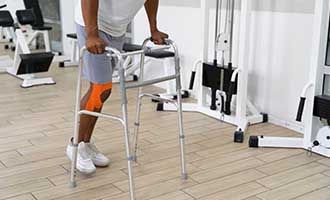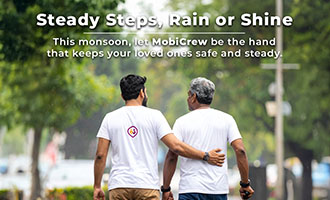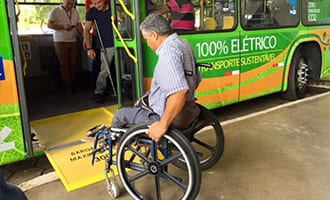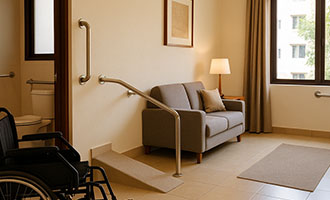Rolling Towards Peace
Stress Relief Strategies for Wheelchair Users

Living with limited mobility can present unique challenges, including the experience of stress. However, managing stress effectively is crucial for overall well-being. Whether dealing with physical limitations, navigating accessibility issues, or handling social interactions, there are several strategies that can help individuals on wheelchairs manage stress and lead fulfilling lives.
1. Prioritise Self-Care
Self-care is the foundation of stress management. Engage in activities that promote relaxation and joy. This could include hobbies, reading, listening to music, or spending time in nature. Regularly taking time for yourself can help alleviate stress and improve your overall mood.
2. Practice Mindfulness and Meditation
Mindfulness and meditation are powerful tools for managing stress. These practices help in staying present and reducing anxiety about future uncertainties. Even a few minutes of mindfulness exercises each day can significantly lower stress levels. There are numerous apps and online resources available to guide beginners through the process.
3. Maintain a Healthy Lifestyle
Physical health directly impacts mental health. Ensure a balanced diet, adequate hydration, and sufficient sleep. Engage in physical activities that are suitable for your mobility level, such as adaptive sports, swimming, or wheelchair yoga. Regular exercise releases endorphins, which are natural stress relievers.
4. Build a Support Network
Having a strong support network is vital for managing stress. Connect with family, friends, or support groups who understand your challenges and can offer emotional support. Online communities can also be a valuable resource for sharing experiences and gaining insights from others in similar situations.
5. Stay Organized
Disorganization can lead to unnecessary stress. Keep your living space tidy and your daily schedule organized. Use planners or digital apps to manage appointments, medications, and other responsibilities. Being organized can help you feel more in control and reduce anxiety.
6. Seek Professional Help
Sometimes, managing stress requires professional assistance. Therapists and counselors can provide coping strategies and emotional support tailored to your specific needs. Don't hesitate to reach out for professional help if you find stress overwhelming.
7. Engage in Social Activities
Isolation can exacerbate stress. Engage in social activities that you enjoy and that are accessible to you. Whether it’s joining a club, attending community events, or participating in online forums, staying socially active can provide a sense of belonging and reduce stress.
8. Use Assistive Technology
Assistive technology can greatly enhance independence and reduce stress. Explore devices and apps designed to make daily tasks easier, such as voice-activated controls, specialized wheelchairs, or home automation systems. These tools can simplify your routine and improve your quality of life.
9. Practice Positive Thinking
A positive mindset can make a significant difference in managing stress. Practice gratitude and focus on the positive aspects of your life. Surround yourself with positivity through inspirational books, quotes, or uplifting media. Positive thinking can boost your resilience and help you cope better with stress.
10. Advocate for Accessibility
Stress can often stem from accessibility challenges. Advocate for improved accessibility in your community. Join or support organisations that work towards making public spaces, transportation, and facilities more wheelchair-friendly. Advocacy not only helps create a better environment for everyone but also empowers you to make a tangible difference.
Conclusion
Managing stress is a continuous process that requires effort and dedication. By prioritising self-care, staying organised, seeking support, and maintaining a positive outlook, individuals on wheelchairs can effectively manage stress and lead fulfilling lives. Remember, you are not alone in this journey, and numerous resources and communities are available to support you every step of the way. Embrace these strategies and take proactive steps towards a stress-free and enjoyable life.
Related
-

Embracing Holistic Wellness: A Guide for Seniors and Individuals with Mobility Needs
-

Physiotherapy tips for home
-

Adaptive Fitness: Exercise Tips for Individuals with Limited Mobility
-

Rollin' in the Greens.
-

Rolling Through the Rain: A Monsoon Safety Guide for Wheelchair Users
-

Best Elderly Care Apps for Seniors in 2025
-

Top Qualities to Look for in Elderly Carers in Mumbai
-

Understanding Spina Bifida: Symptoms, Types, and Early Detection
-

Benefits of Hiring a Companion for Elderly Care in Mumbai
-

Choosing the Right Care Taker Services in Mumbai for Your Needs
-

How to Choose Reliable Mobility Services at Home in Mumbai
-

Sports Injury Prevention Strategies for Mumbais Active Youth
-

Best Wheelchairs for Senior Citizens in Mumbai Buyers Guide
-

Why Routine Health Check-Ups Matter for Wheelchair Users
-

Beginners, chair cardio is the way to go!
-

Finding the Perfect Health Service Provider: Tips for Elderly Care
-

How Accessible Homes Create Truly Independent Living
-

Tips to Choose the Right Physical Therapist for Your Needs
-

Get in the game
-

Tips To Empower People with Limited Mobility
-

In-Home Health Care Services in Mumbai Using the MobiCrew App
-

The power of Pilates
-

Breathing right can change your life
-

Beyond the Wheelchair: Why Emotional Support Is Just As Important As Physical Help
-

How to Choose the Right Sports Rehab Treatment Clinic Near You
-

Understanding the Benefits of In-Home Elder Care for Loved Ones
-

Stay in shape with Yoga
-

Focus your mind to stay healthy
-

How Sport Rehabilitation in Mumbai Helps Athletes Bounce Back Stronger
-

Top Benefits of Visiting a Physical Therapy Clinic
-

The Importance of Wheelchair Assistance for the Elderly
-

Best Physical Therapies in Mumbai for Post-Operative Recovery
-

Enhancing Sleep Quality for Wheelchair Users
-

Dating with a Disability: Navigating Love, Relationships, and Mobility Challenges
-

Slippery Roads Ahead: How to Keep Elderly Loved Ones Safe This Monsoon
-

Innovative Walking Assistance Devices for Adults
-

Wheels of Support
-

The Role of Hydration in Health and Wellness
-

The Ultimate Guide to Choose the Right Walking Devices for Adults
-

How to Help People with Disabilities: A Guide to Inclusive Practices
-

Fashion Forward: Style Tips for People with Limited Mobility









